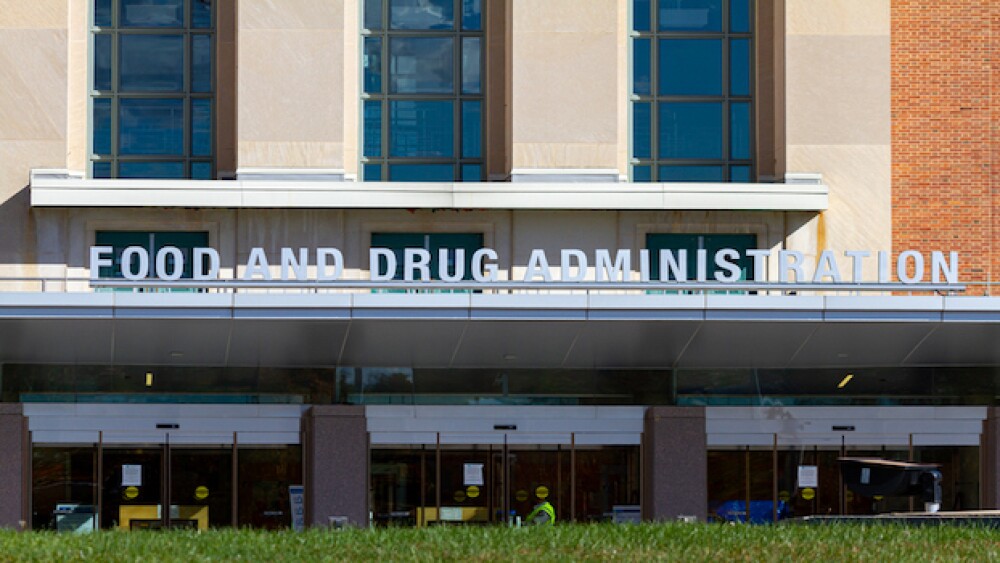Partners Biogen and Sage Therapeutics had sought approval for the therapy in both postpartum depression and major depressive disorder, but the FDA rejected the application for the latter.
Pictured: FDA Headquarters/iStock, Grandbrothers
In a bittersweet decision for Biogen and Sage Therapeutics, the FDA approved the fast-acting therapy zuranolone Friday as the first pill for postpartum depression—but rejected the treatment for major depressive disorder.
Zuranolone—to be marketed as Zurzuvae in postpartum depression (PPD) —is only the second treatment for this indication and the first pill that can be taken at home. Prior to Zurzuvae, there was only one FDA-approved treatment for PPD—Sage’s Zulresso (brexanolone)—but as it must be administered intravenously at a hospital, it is out of reach for many women, Fortune Well reported.
Zurzuvae also marks a significant change from the current treatment paradigm, which consists of drugs that are longer acting, showing efficacy typically within six to eight weeks, Sage Chief Business Officer Chris Benecchi, told BioSpace in a previous interview.
However, the fast-acting pill—jointly developed by Biogen and Sage—can improve symptoms in as little as three days. Zurzuvae is a neuroactive steroid that works as a positive allosteric modulator of GABA-A receptors. Lower levels of GABA in the body have been linked to depression.
The companies expect to launch and have Zurzuvae commercially available for patients in the fourth quarter of this year, following its scheduling as a controlled substance by the U.S. Drug Enforcement Administration.
Biogen and Sage supported the New Drug Application for Zurzuvae with Phase III clinical trials for PPD and major depressive disorder (MDD), both of which hit their primary and secondary endpoints. In the SKYLARK trial of patients with PPD, Zurzuvae dosed at 50 milligrams demonstrated a “clinically meaningful and statistically significant improvement in depressive symptoms” after 15 days of treatment, according to the partners. Zurzuvae was “generally well-tolerated,” with all treatment-emergent adverse events (TEAEs) being mild or moderate in severity.
In the CORAL study in MDD, zuranolone—given with a standard of care antidepressant—showed a statistically significant reduction in depressive symptoms after three days of treatment, an effect that was sustained after two weeks, Sage and Biogen reported in February 2022. Zurzuvae was again well-tolerated.
Despite the positive data, the FDA came back late Friday with a Complete Response Letter (CRL) in MDD, stating that the application did not provide “substantial evidence of effectiveness” to support its approval, and that another study, or “studies”, would be required.
In a prepared statement, Biogen CEO Chris Viehbacher said the partners would “thoroughly review the feedback from the FDA on the use of zuranolone in MDD to determine next steps.”
Zurzuvae’s approval in PPD is the third this year for Biogen, which itself is undergoing a transformation under Viehbacher, who took the helm in January from Michel Vounatsos, whose tenure was marred by the controversial FDA approval of Alzheimer’s drug Aduhelm.
Viehbacher’s tenure got off to a good start with the January 6 approval of Biogen’s second Alzheimer’s drug, Leqembi—partnered with Eisai—which won traditional approval in July. Then in April, the FDA greenlit the company’s Qalsody as just the fourth therapy for amyotrophic lateral sclerosis and the first for a genetic form of the disease.
Depression is big business for the biopharma industry, with the global market for depression treatment predicted to reach $16.8 billion by 2032, according to Future Market Insights. MDD is the larger slice of this, with an estimated 21 million American adults experiencing at least one major depressive episode in 2021, per a survey conducted by the National Institute of Mental Health.
While lauding the approval of Zurzuvae for PPD, Sage CEO Barry Greene said, “In regard to the CRL for MDD, we are highly disappointed for patients, particularly amid the current mental health crisis and millions of people with MDD struggling to find symptom relief.”
Heather McKenzie is a senior editor at BioSpace. You can reach her at heather.mckenzie@biospace.com. Follow her on LinkedIn and Twitter @chicat08.






